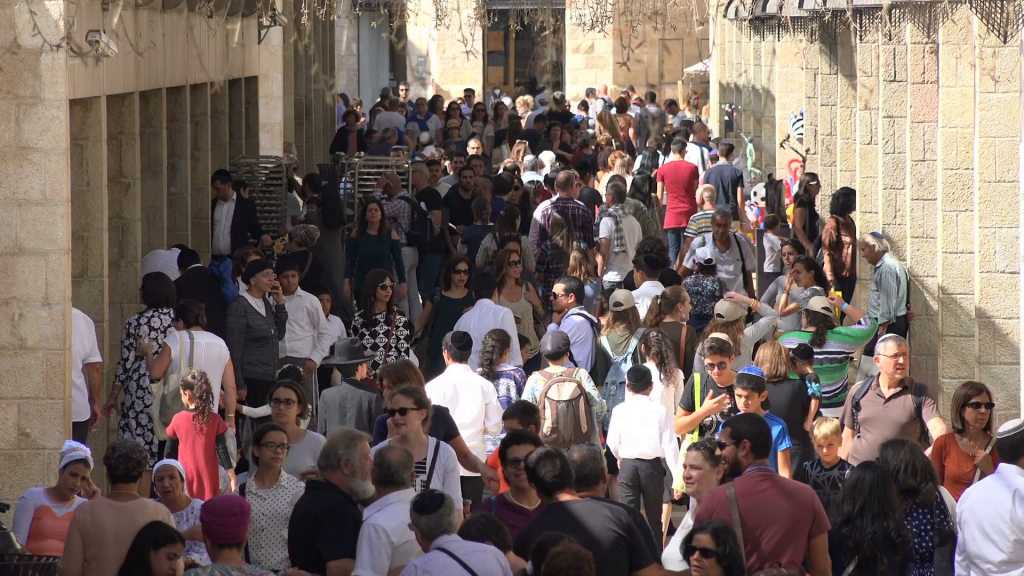Australia/Israel Review, Featured
“It’s the economy, stupid?”
Feb 28, 2019 | Amotz Asa-El

“Israel has no foreign policy, only domestic policy,” said a frustrated Henry Kissinger back in the 1970s, while mediating military disengagement talks between the Jewish state and its neighbours.
The US Secretary of State meant that, in facing international dilemmas, Israeli leaders were thinking electorally rather than strategically. In fact, for most of the Jewish state’s 70 years, it was the other way around.
Israel’s political debates have almost always been dominated by international issues, like the reparations agreement with West Germany in 1952, the future of the territories conquered in 1967, responsibility for the outbreak of the 1973 Yom Kippur War, the rationale for the 1982 First Lebanon War, the costs and benefits of the 1993 Oslo Accords, the violence in the West Bank and Gaza before and after that event, and so on.
Domestic policies did not even dominate the election of 1984, when voters, despite facing Israel’s worst economic crisis ever, were more concerned with the situation in Lebanon.
The current election disrupts this unique legacy.
With the Arab world embroiled in multiple civil wars; with most Israelis expecting no deal with the Palestinians in the foreseeable future; with the Iranian threat a matter of consensus; and with Benjamin Netanyahu’s main rival, Lt-Gen (res.) Benny Gantz, expressing hawkish views – foreign affairs are largely a non-issue in this election.
Voters will therefore be thinking domestically when they go to the polls on April 9, and their choices will be made largely based on legal and economic issues.
On the legal front, the bribery allegations Netanyahu faces are steadily shaping this election as a constitutional drama, underscored by the Prime Minister’s attacks on the judiciary as it considers indicting him on multiple corruption charges.
On the economic front, the election has taken an unexpected twist with the chairman of the Israeli trade union umbrella organisation, the Histadrut, joining Gantz’s ticket.
At the same time, the macroeconomy, while still robust, has been squeaking in a way that might shift some swing voters.
The resilience that has characterised the Israeli economy for nearly two decades is, to be sure, still present.
Israeli GDP grew last year by 3.2%, second among the world’s 36 most developed economies only to Poland’s 5.1%. Unemployment tumbled to a mere 4.1%, while consumer prices rose by a negligible 0.8%.
Even so, the shekel, Israel’s currency, lost nearly a tenth of its value last year, as it slowly but steadily slid from a rate of 3.39 shekels to the US dollar when the year began, to 3.71 when it ended.
The shekel has since rebounded, appreciating in 2019’s first six weeks by nearly 3%, to 3.6 shekels to the dollar. This reflects both non-Israeli developments, like concerns over a potential recession in the US, and Israeli developments, such as credit-rating company S&P’s re-affirmation of Israel’s rating of AA- and Intel’s decision to invest a further US$40 billion in its already elaborate Israeli operation.
Even so, the shekel’s conduct in 2018 reflected concerns in financial markets over a creeping, but evident, loss of fiscal discipline by the Netanyahu Government.
Figures reported in January indicated that the budget deficit had climbed over the previous 12 months to 3.3% of GDP, thus exceeding the government’s stated goal of 2.9%.
Moreover, whereas Israeli governments had previously finished the specific month of January with fiscal surpluses, in the first month of this year the Netanyahu government spent NIS 800 million more than it earned. This contrasts with – for instance – January 2018, which it ended with a NIS 4.7 billion surplus.
Even more significantly, total public debt, which since Netanyahu’s return to power a decade ago had declined steadily from 80% of GDP to 60.5% at the end of 2017, last year reversed course and inched up to 61.2% of GDP.
Lurking behind these numbers are Netanyahu’s political formula, which led to the installation of a finance minister whose beliefs and interests were often antithetical to the Prime Minister’s.
Netanyahu’s political formula for cementing a governing coalition, which involved handing even the most sensitive cabinet positions to smaller parties in the government, put the Treasury in the hands of Moshe Kahlon, whose centre-right party, Kulanu (“All of Us”), won less than one-tenth of the vote in the 2015 elections.

Finance Minister Kahlon and PM Netanyahu: Differing economic priorities
Netanyahu similarly gave the defence and education ministries to coalition allies who won even fewer votes (the former to Yisrael Beitenu’s Avigdor Lieberman, who has since resigned, and the latter to Naftali Bennett from the Bayit Yehudi faction, which he has since split from to form a new party).
Founding Israeli PM David Ben-Gurion, by contrast, always kept these key portfolios in the hands of his own Labor party – as well as the Foreign Ministry, which Netanyahu has also outsourced in the past (to Lieberman).
Unlike the famously Thatcherist Netanyahu, Kahlon has a weakness for populism. In addition, his interests, as the head of a small and struggling party, are to shower budget goodies, where possible, on potential constituencies.
That is why, last year Kahlon heeded Israel Police’s demand to raise salaries and pensions for officers by an annual NIS 600 million which, together with retrospective raises, amounts to some NIS 15 billion over 15 years. The macroeconomic costs of the move are potentially even heftier than that, because it stimulates demands from other parts of the public sector for similar large raises.
Back when Netanyahu was finance minister in 2003-05 such largesse was unthinkable, especially when the new funding’s source was not specified, as in this case. Still, Kahlon felt his political situation demanded such generosity, and Netanyahu felt his own political situation left him no choice but to go along with his Finance Minister’s munificence.
Of course, such a fiscal move directly affects only a small population, yet in another part of the economy, the housing market, everyone has been affected by the outgoing government’s actions and inactions.
Housing prices in Israel have nearly doubled over the last decade. Unlike Israel’s previous housing crunch, which was fed largely by the immigration from the former Soviet Union, the current pressures reflect Israeli birthrates – the highest in the developed world.
Netanyahu and Kahlon set out to ease the market pressure in various ways, including speeding licensing procedures to expand existing apartment buildings, offloading more state-owned real estate to the market, and auctioning real estate to contractors who promise the lowest retail prices.
Looking back over four years of the policy, the potion seems to have been well-mixed, but the dosage was too low. The rise in housing prices has been stemmed, and in 2018 it was in fact reversed, with average prices declining 1.4%. However, the average flat’s price remains exorbitant for a young couple, equaling more than 10 years of the gross average salary.
The housing crisis affects the entire working and middle classes – in which everyone is either an apartment seeker or the parent, sibling or child of one.
Yet even more universally palpable is the transport crisis.
With commuters spending hours daily in traffic jams, almost everyone understands that feverish construction of highways and interchanges over recent decades must now be succeeded by a massive overhaul of Israel’s public transportation systems.
The effort is underway, with a subway being built in Tel Aviv, and a fast train that will connect Jerusalem and Tel Aviv and is already running experimentally between the capital and Ben-Gurion Airport. Still, traffic jams are a national scourge, and many voters consider addressing this problem more urgent than anything else.
Back in 1992, Yitzhak Rabin caught the ruling Likud off guard by promising a highway revolution, a vow he fulfilled, along with other economic promises, like universal healthcare and higher pay for doctors and teachers.
The current election seems ripe for a similar economic twist, driven by a platform akin to Rabin’s 27 years ago.
This is why Gantz has decided to harness Histadrut leader Avi Nissenkorn – a lawyer and labor law specialist who managed to force large employers to hire disabled employees, raise pension deductions and provide proper salaries to cleaning workers previously paid by the hour.

Benny Gantz and his new recruit, union leader Avi Nissenkorn
Gantz hopes to attract working class and union support for his candidacy.
Nissenkorn’s recruitment to Gantz’s new Hosen Leyisrael (“Israel Resilience”) party comes at the expense of his former and natural home, the embattled Labor Party which polls predict will win only 8% of the vote.
What Gantz promises in the realm of compassion could be complemented in the realm of fiscal discipline by the election’s other key centrist, Yair Lapid of Yesh Atid (“There is a Future”), who kept the budget balanced when he served as finance minister in Netanyahu’s previous government.
As of this writing, Gantz and Lapid are expected to form a joint ticket. If this comes to pass, its prospects might be determined not by Netanyahu’s legal situation, which for now appears to be failing to remap the political field, but by an economic platform. If this were crowned by a budgeted and deadlined blueprint for delivering subways, fast train and metro systems from Haifa to Beersheva, it’s possible Kissinger’s claim that Israeli politics is really all about domestic affairs would finally be vindicated.
Tags: Israel






